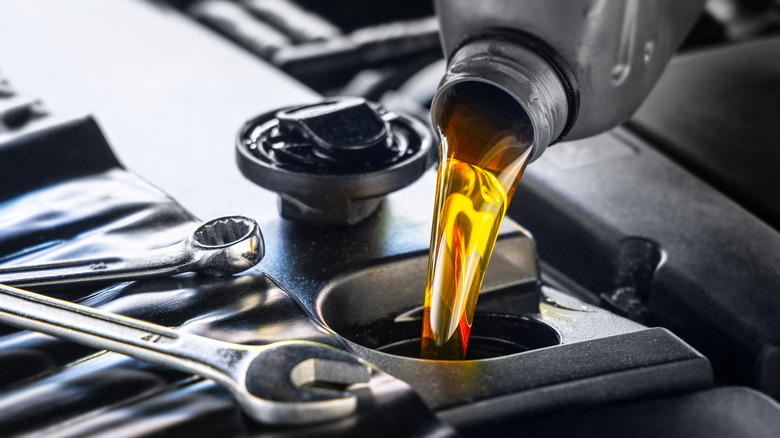
Deepblue4you/Getty Images
By Joe Hindy/
Motor oil is the lifeblood of your vehicle. It keeps the internal components of the engine nicely lubricated so they can continue to operate for as long as possible. It also keeps your engine components from wearing down prematurely, helps dissipate heat, and maintains the engine. Prompt oil changes represent arguably the most important maintenance advice anyone can give to a car owner. After all, old and dirty oil loses its ability to lubricate, which is the whole point of it being there.
However, it’s not just about ensuring you have fresh oil in your car. The type of oil matters too. Automakers require drivers to use certain oil weights in their vehicles and some even use custom formulations for their vehicles. Thus, if your owner’s manual says to use 0W-20 oil, then you should probably use 0W-20 oil. Using a different weight can cause all sorts of problems, including engine wear and potentially a breakdown. All of this information will work for the majority of your car’s life. Once it ages, though, things get a little more complicated.
Once your car reaches a certain mileage, you’ll start hearing more and more about high-mileage oil. In terms of lubrication properties, it is virtually identical to regular motor oil. However, it’s formulated specifically for aging engines, and choosing the right oil can be tough, especially since there’s no real need to know about it until your car hits around 75,000 miles or so.
Read on for more about every major brand’s high-mileage oil.
Why you should consider high-mileage motor oil

Dusan Stankovic/Getty Images
Much like human bodies, car engines change as they age. Even with proper lubrication, parts eventually wear down and become less effective. Seals and gaskets may degrade some, which causes oil leaks. Cylinder wear can reduce the efficiency and power of an engine as the bores widen. Oil can only do so much, after all, so some friction wear is an inevitability. Lubricating an older engine is not the same as lubricating a newer one.
That’s where high-mileage oil comes in. It still lubricates just like regular oil. However, oil brands put in a variety of additives to help combat the issues of an aging engine. For example, most of them add a detergent that helps reduce and remove sludge from your engine components. Another common additive is seal conditioners that help restore a seal’s shape and flexibility, which can stop and prevent oil leaks. These additives directly combat the issues that commonly arise when an engine ages. Of course, other choices like oil filters matter as well.
While it is not a requirement to put high-mileage oil into older engines, it is an option worth exploring. After all, replacing old gaskets or flushing the engine of gunk costs a lot of money, and these oils can do at least some of the work for the cost of an oil change. High-mileage oil won’t perform miracles, but on a reasonably well-maintained car, such oil can help. If you would like to do more research, the Bob Is The Oil Guy forums have chemical breakdowns of nearly every popular type of motor oil.
7.) Ravenol SVT High Mileage Semi-Synthetic Motor Oil
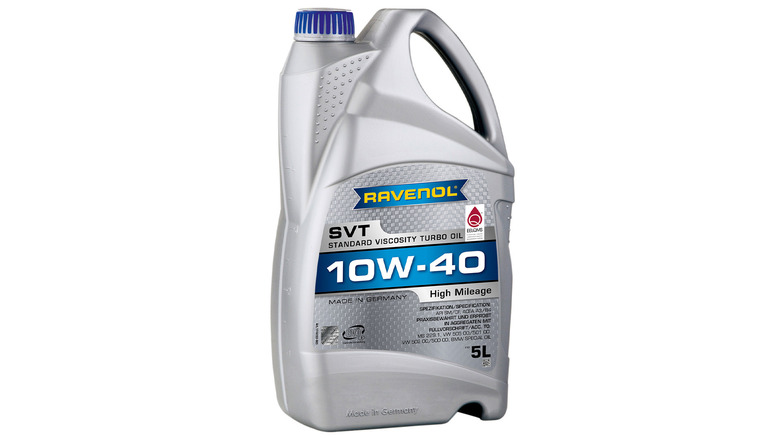
Ravenol
Ravenol is a good place to start since it’s a pretty decent brand of motor oil. In fact, it’s an official supplier of oil to Mercedes-Benz, which is pretty high praise. The brand makes several different types of motor oil, including the Ravenol SVT High Mileage variant. It is a semi-synthetic oil. That means it’s a mix of conventional and synthetic oil. According to Ravenol’s official website, the brand sells the oil in 0W-40 and 5W-40 weights.
The brand recommends switching to this oil around the 60,000-mile (100,000-kilometer) mark on your vehicle. It boasts conditioning and cleaning additives as do most other high-mileage oil brands. Additionally, it claims to prevent sludge buildup, reduce oil consumption, and improve wear protection. The high-oxidation formula also helps it live longer.
The reason Ravenol is a bit lower on the list is due to the lack of data. There aren’t a ton of reviews online and not much information is publicly available about the formula or how well it works. Plus, it only comes in two weights, limiting its availability. By all accounts, it’s a good motor oil. There just isn’t a ton of additional data about it.
6.) Royal Purple HMX High Mileage Synthetic
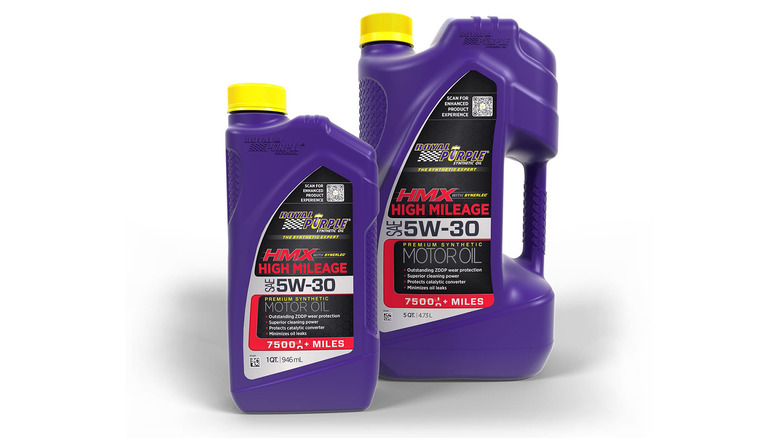
Royal Purple
Royal Purple is another premium brand, similar to Ravenol. As such, the brand’s motor oil tends to be more expensive than other competitors. The HMX variant of Royal Purple’s motor oil is for high-mileage vehicles. Royal Purple recommends using the oil on vehicles with 75,000 miles (120,000 kilometers). The brand boasts high film strength in all of its motor oils, which helps reduce friction and engine wear. They also add purple dye to the oil to give it its trademark purple hue when it comes out of the bottle. Don’t worry, the dye dissipates shortly after it starts getting used.
In general, folks tend to have good things to say about Royal Purple. Reviews are a bit scarce online, however, there doesn’t seem to be any issues with using Royal Purple oil, at least not anecdotally. Most negative feedback about the brand is specific to its price point, which is higher than most popular oil brands. Plus, the purple oil is a bit gimmicky. In terms of features, the HMX variant includes a zinc/phosphorus anti-wear additive, additives for low-speed pre-ignition (LSPI) wear protection and additional additives to help keep the engine clean and protect against corrosion.
Unlike some other brands, Royal Purple is a bit more open about its formulation, and there are more additives to protect against more things. It’s also available in a reasonable number of weights, including 0W-20, 5W-20, 5W-30, and 10W-30. The only real negative is that it’s more expensive than the majority of the oil brands on the list.
5.) Quaker State High Mileage Motor Oil
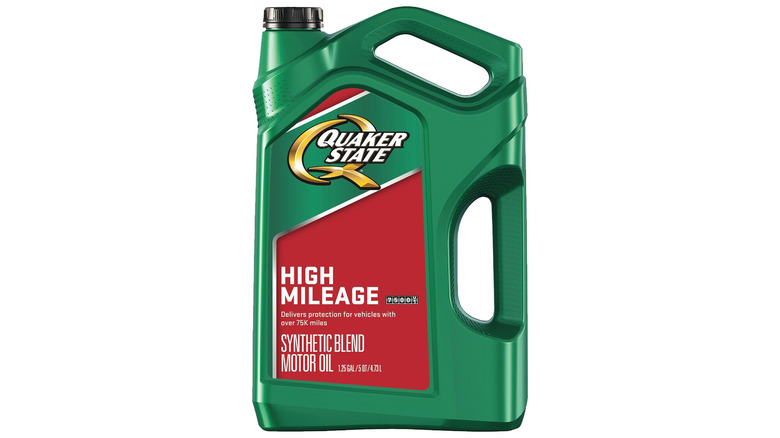
Quaker State
Quaker State is a fairly big name in the motor oil space. The brand is owned by Shell, one of the largest oil companies in the world. The brand sells more than half a dozen different types of oil that range from regular synthetic blend to its Ultimate Protection Full Synthetic along with a European-specific brand that adheres to European regulations. All of its oil variants are fairly well regarded.
There isn’t a lot of information about the high-mileage oil from Quaker State. The company says it contains anti-wear additives along with seal conditioners to help with those types of problems, which is fairly typical of the product type. It also contains some of the features of its other oil variants, such as oil breakdown resistance additives. In addition, Quaker State has three total high mileage oils, including a full synthetic, an all-miles branded variant, and the standard high mileage variant, which gives drivers some choices.
We’re basing our ranking here on tests conducted with Quaker State’s other oils. In testing, Quaker State does well, especially at its price point. Plus, it’s available in a variety of weights, including 0W-20, 5W-20, 5W-30, 10W-30, 10W-40, and 20W-50. The wide coverage makes Quaker State’s availability its strongest feature versus competitors lower on the list.
4.) Castrol Edge High Mileage Synthetic Motor Oil
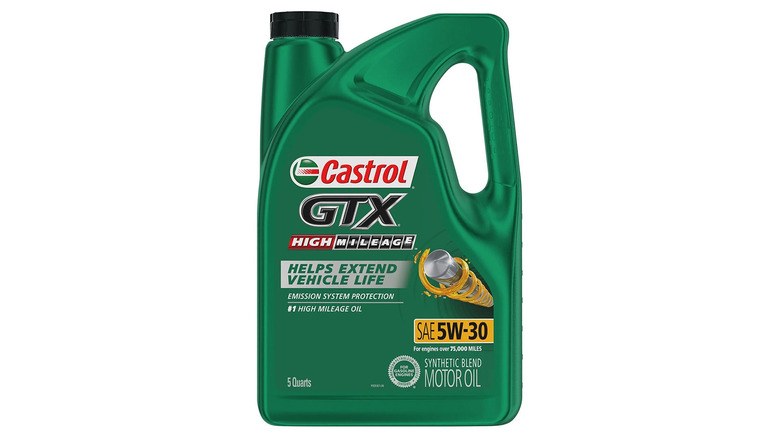
Castrol
Castrol is another huge name in the motor oil business. The company was purchased by BP in 2002, and like Shell, BP is one of the biggest oil companies on Earth. Thus, it is fair to assume that they know a thing or two about oil. The brand has two high-mileage oil variants. They are Castrol Edge High Mileage and Castrol GTX High Mileage. Of the two, Castrol claims more performance benefits with the Edge variant than the GTX variant. Despite that, Castrol claims that the GTX is the most popular among DIY consumers.
Both types of oil boast many of the same benefits, including seal conditioners, improved temperature performance, anti-wear protection, and a reduction of oil burn-off. Castrol’s claim to fame is its Phosphorus Replacement Technology, which Castrol says will help extend the life of your emissions systems. While few technical reviews are available, a lot of folks recommend Castrol due to its price, availability, and reputation. Online reviews agree, with few negative reviews online for either type of motor oil. We checked with Fakespot as well, and the reviews are mostly legitimate.
Castrol GTX comes in 5W-20, 5W-30, 10W-30, 10W-40, and 20W-50. Meanwhile, Castrol Edge comes in 0W-20, 5W-20, 5W-30, 10W-30, and 10W-40. Between the two brands, that should cover most vehicles on the road today. Folks with GM vehicles should use Castrol Edge, as the brand is GM dexos1 approved for GM vehicle use.
3.) Mobil Super High Mileage Oil
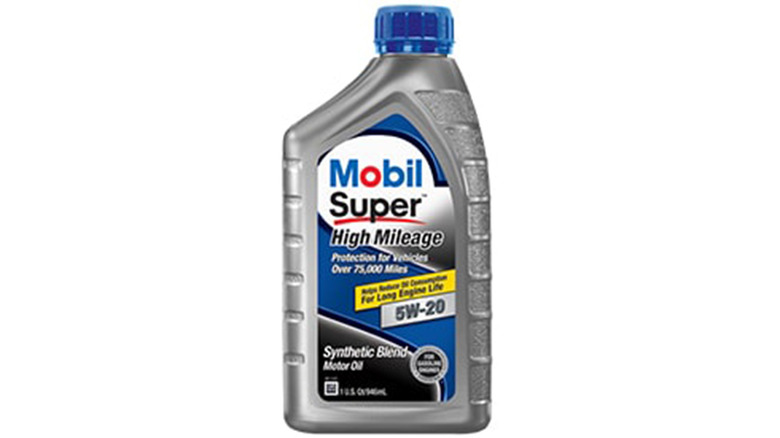
Mobil
Mobil is a subsidiary of ExxonMobil, another one of the biggest oil companies. Like many of the other bigger brands, Mobil has multiple high-mileage oils. In fact, Mobil has four of them. They are Mobil 1 Extended Performance High Mileage, Mobil 1 High Mileage, Mobil Full Synthetic High Mileage, and Mobile Super High Mileage. The differences are fairly minor, and include availability, different weights, different mixes of synthetic and conventional oil, and slightly different additive packages to change the properties a bit.
For the most part, the variant you want to try out depends on what kind of car you drive. The Mobil Super High Mileage is a blend of synthetic and conventional oil with additives that help prevent sludge, engine rust, and corrosion. It’s not a bad way to go for vehicles where conventional oil is preferred over synthetic, like older vehicle engines. Meanwhile, the Mobil 1 High Mileage is a full synthetic that includes LSPI protection along Mobil’s Triple Action Formula that helps clean the engine, prevent sludge, and more. The other two are more scarce, but also offer similar preventative benefits such as seal conditioning.
Generally speaking, Mobil is considered a solid oil brand. The brand as a whole has a variety of positive reviews. They’re commonly put side by side with other high-end motor oils, and it is promoted by BMW and Mercedes as being officially compatible with the brands’ vehicles. You could certainly do worse. Between the four variants, Mobil high mileage oils come in 0W-20, 5W-20, 5W-30, 5W-30, 10W-30, and 10W-40, which covers a wide range of vehicles.
2.) Pennzoil Platinum High Mileage Motor Oil
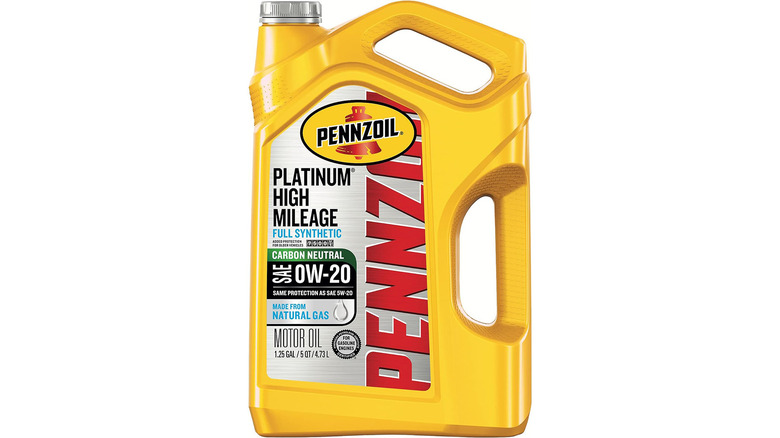
Pennzoil
Pennzoil is a household name when it comes to motor oil, and, like Quaker State, is also owned by Shell. The two stablemates share a lot in common with each other. For example, Pennzoil also has three high mileage oil variants, just like Quaker State, along with excellent availability across a wide range of oil weights. Fun fact — Pennzoil became the first company to make motor oil entirely out of natural gas (it took 40 years and 3,500 patents). The jury is still out on whether or not it’s the better oil, but it’s certainly an interesting oil.
Pennzoil’s High Mileage Motor Oil is at the bottom of the stack and boasts additives for reducing leaks and oil consumption, reducing wear, and preventing sludge build-up. The Pennzoil High Mileage Full Synthetic adds improved resistance to oil breakdown in severe environments and seal conditioners. At the top, Pennzoil Platinum High Mileage Full Synthetic increases the wear protection, boasts improved performance in both heat and cold, and extra detergents to keep pistons clean. All three variants include Pennzoil’s Active Cleansing Agents that help clean up and prevent sludge.
Between the three variants, Pennzoil’s high mileage oil is available in 0W-205W-20, 5W-30, 10W-30, and 10W-40, giving it good coverage of vehicles on the road today. Pennzoil has a reasonably good reputation among consumers, with high marks that we cross-checked with FakeSpot, and plenty of recommendations on sites like Reddit and Bob Is The Oil Guy.
1.) Valvoline High Mileage with MaxLife
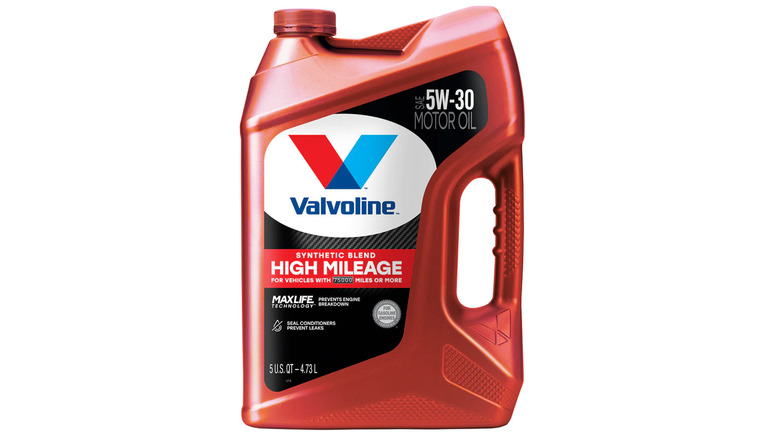
Valvoline
Valvoline has a few distinctions that separate it from a lot of its competitors. The biggest of which is that it’s not a subsidiary of a large oil company. Valvoline has a few different variants of high mileage oil, including Valvoline Extended Protection, Valvoline Full Synthetic High Mileage with MaxLife, Valvoline High Mileage 150K with MaxLife, and Valvoline High Mileage with MaxLife along with a European variant that specifically adheres to European regulations. There are few differences between them, but Valvoline High Mileage with MaxLife seems to tick the most boxes.
All of Valvoline’s variants boast additives that help prevent engine breakdown, refresh seals, prevent leaks, and add additional anti-friction properties. While some oils boast the MaxLife branding and others don’t, it doesn’t matter much. MaxLife is simply a branding for the products in Valvoline’s lineup that is designed for higher mileage vehicles and also includes power steering fluid, fuel system cleaner, transmission stop leak, fuel injector cleaner, and water remover. However, the non-MaxLife motor oils designed for high mileage boast varying levels of the same benefits.
In general, Valvoline is fairly popular with consumers and well-regarded. It’s been around for years with few issues. Valvoline also uses its own oil in its physical locations, unless you specifically ask for something else. Valvoline boasts plenty of accolades over competitors and is the official oil of several racing companies, including NASCAR, Formula Drift, and the NHRA. Valvoline high mileage motor oils are available in 0W-20, 0W-40, 5W-20, 5W-30, 5W-40, 10W-30, and 10W-40.